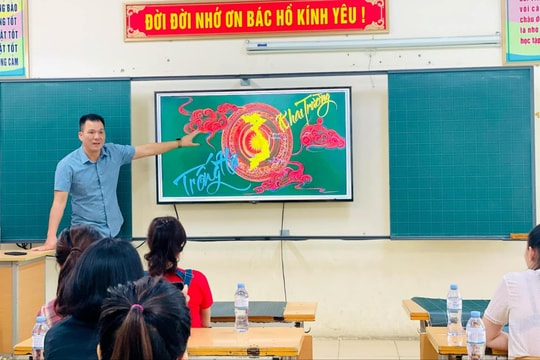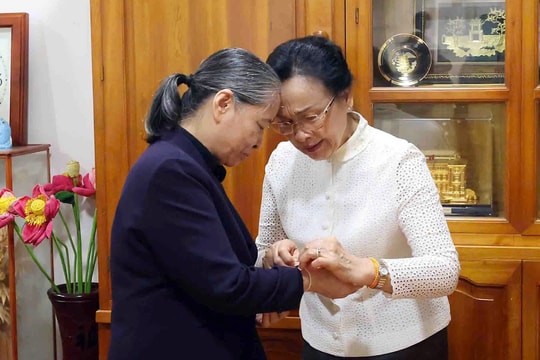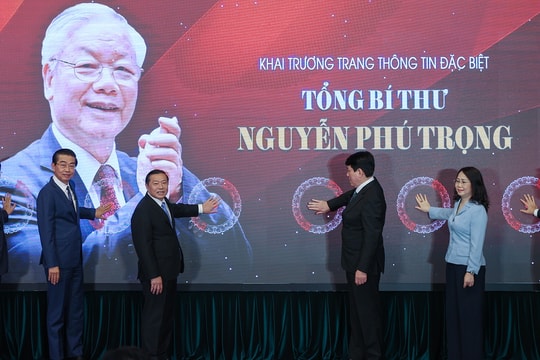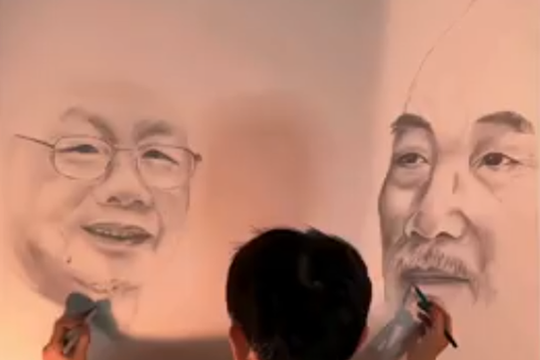Strengthening strategic ties, improving the effectiveness of Vietnam-Russia cooperation
At the invitation of Russian President Vladimir Putin, General Secretary Nguyen Phu Trong will pay an official visit to the Russian Federation from September 5 to 8, 2018.
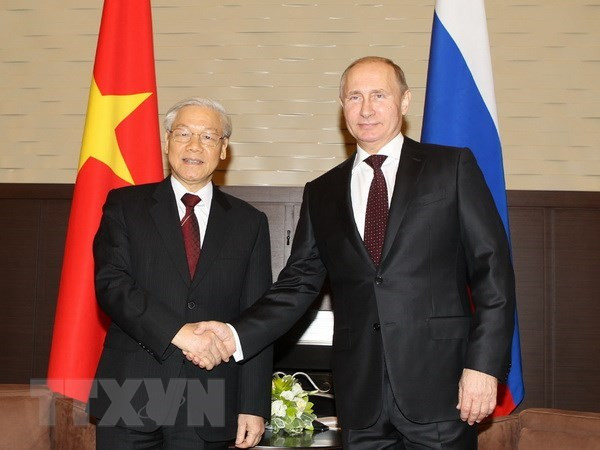 Russian President Vladimir Putin welcomed General Secretary Nguyen Phu Trong during his visit in 2014. (Photo: Tri Dung/VNA)
Russian President Vladimir Putin welcomed General Secretary Nguyen Phu Trong during his visit in 2014. (Photo: Tri Dung/VNA)
Vietnam-Russia relations develop strongly
The Soviet Union was one of the first countries in the world to recognize and officially establish diplomatic relations with Vietnam on January 30, 1950, laying the foundation for a strong friendship and good cooperative relationship between the two countries later on.
History shows that the relationship between Vietnam and the former Soviet Union and the Russian Federation today has always been warm and trusting, overcoming all challenges of time and historical fluctuations.
After the dissolution of the Soviet Union (December 1991), the multifaceted, mutually beneficial cooperation between Vietnam and the Russian Federation continued to be valued and increasingly developed strongly and comprehensively. The signing of the Treaty on the basic principles of friendly relations between Vietnam and the Russian Federation on June 16, 1994, during Prime Minister Vo Van Kiet's visit to Russia, opened a new stage of development in the relationship between the two countries.
Subsequently, mutual visits by senior leaders of both sides took place regularly. In particular, the visit of President Tran Duc Luong to the Russian Federation in August 1998 created a new breakthrough in the multifaceted cooperation between the two countries. For the first time, Russian President Boris Yeltsin affirmed that Russia considered Vietnam a strategic partner in Southeast Asia. And the framework of Vietnam-Russia relations in the 21st century was formalized by signing the Joint Statement on Strategic Partnership on the occasion of Russian President Vladimir Putin's visit to Vietnam (February 28 to March 2, 2001). Vietnam-Russia political relations have a high level of trust and are constantly being strengthened. On July 27, 2012, Vietnam and Russia issued a Joint Statement on further strengthening the Comprehensive Strategic Partnership. Vietnam and the Russian Federation have signed more than 30 State and Government-level documents, a massive legal basis for the development of cooperative and friendly relations between the two countries in the new period.
Since 2008, Vietnam and Russia have established an annual diplomatic-defense-security strategic dialogue mechanism at the level of Permanent Deputy Foreign Minister; in 2013, a Strategic Dialogue mechanism was established at the level of Deputy Defense Minister. In addition, the two sides conduct regular political consultations at the level of Deputy Foreign Minister and Department and Division within the framework of cooperation between the two Foreign Ministries. The two sides share the same views on many international and regional issues, closely coordinate and support each other in international forums such as the United Nations, Asia-Pacific Economic Cooperation Forum, Asia-Europe Cooperation Forum, ASEAN Regional Forum, etc.
Raising two-way trade turnover to 10 billion USD
The economic and trade cooperation between Vietnam and the Russian Federation has developed dynamically in recent times, but is not commensurate with the potential of the two countries. The mechanism of the Intergovernmental Committee on Economic, Trade, Scientific and Technical Cooperation, established in 1992, has been maintained by the two countries and upgraded to the Deputy Prime Minister level since 2011. The Intergovernmental Committee meetings are held annually; the most recent was the 20th Meeting of the Vietnam-Russia Intergovernmental Committee on Economic, Trade, Scientific and Technical Cooperation in September 2017 in Ho Chi Minh City. The Vietnam-Russia Business Council was established to support trade and investment promotion for the business communities of the two countries. In 2007, Vietnam and Russia mutually recognized each other as having a market economy.
In recent times, two-way trade between the two countries has increased sharply, especially in the context of the Free Trade Agreement between Vietnam and the Eurasian Economic Union taking effect from October 2016. The implementation of this Agreement will be an opportunity to create a breakthrough, towards the goal of increasing two-way trade turnover to 10 billion USD by 2020.
Currently, the Russian Federation ranks 26th in terms of export market and 22nd in terms of import market of Vietnam. In 2017, the total two-way trade turnover between Vietnam and the Russian Federation reached 3.5 billion USD, of which exports reached 2.1 billion USD (up 34% compared to 2016), Vietnam's imports from the Russian Federation reached 1.4 billion USD (up 23% compared to 2016). In the first 4 months of 2018, the import-export turnover between the two countries reached 1.43 billion USD (up 31.83% compared to the same period in 2017), of which Vietnam's exports to the Russian Federation reached 756 million USD (up 23.54%); imports reached 681 million USD (up 42.5%). The main export items of Vietnam to Russia include: Telephones, garments, agricultural, aquatic and seafood products of all kinds...; Main import items include: Petroleum, iron and steel, fertilizer, machinery, equipment of all kinds...
In terms of investment, Russia currently ranks 22nd out of 117 countries and territories investing in Vietnam with 116 valid projects, with a total registered capital of about 990 million USD (including Vietsovpetro and Vietgazprom). Russian investment is mostly concentrated in the fields of oil and gas, industry, manufacturing, energy, mining, transportation, aquaculture and fishing... Vietnam's investment in Russia has increased rapidly in recent years, from just over 100 million USD in 2008, Vietnam currently has 23 investment projects in Russia with a total investment capital of nearly 3 billion USD, focusing mainly on the fields of oil and gas, trade, agriculture...
Vietnam's major investment projects in Russia include: Rusvietpetro and Gazpromviet oil and gas joint ventures, TH-True Milk Group's industrial-scale dairy farming and milk processing complex project in Russia, and Hanoi-Moscow Trade Center-Hotel Complex Project.
Energy is a traditional, strategic and effective area of cooperation, bringing significant revenue to the budgets of Vietnam and Russia. In addition to continuing cooperation within the framework of the Vietsovpetro Joint Venture until 2030, the two countries have established the Rusvietpetro, Vietgazprom, and Gazpromviet Joint Ventures to expand oil and gas cooperation in Vietnam, Russia, and third countries. The two countries have reached an agreement to continue cooperation in the construction and modernization of energy projects in Vietnam.
Promoting cooperation in various fields
Cultural exchange activities are held regularly, contributing to enhancing understanding and friendship between the people of the two countries. The two sides annually and alternately organize Cultural Days in Vietnam and the Russian Federation.
The Russian Federation continues to be one of the top 10 growth markets for tourism in Vietnam. In 2012, Vietnam welcomed 176,000 Russian tourists, in 2013 welcomed 300,000, in 2014 welcomed 364,000, in 2015 welcomed 340,000, in 2016 welcomed 430,000, in 2017 welcomed 570,000 Russian tourists (up 32% over the same period in 2016). The number of Russian tourists to Vietnam in the first 4 months of 2018 reached more than 260,000 (up 13.4% over the same period in 2017). Russia has also become an increasingly attractive destination for Vietnamese tourists.
Previously, the Soviet Union helped Vietnam train nearly 40,000 good cadres and experts in many different fields. Currently, Russia continues to support Vietnam in training human resources. In 2011, Russia granted Vietnam 345 undergraduate and graduate scholarships; in 2012, it increased to 400 scholarships, and 70 scholarships were reserved for training nuclear experts. Currently, Vietnam has about 5,000 students studying in Russia.
The two countries have carried out nearly 60 research and technology transfer projects. Scientific research cooperation within the framework of the Tropical Center in Vietnam has brought many positive results. During the official visit to the Russian Federation by President Tran Dai Quang (June 2017), the two sides signed a Memorandum of Understanding on the construction of the Nuclear Science and Technology Center in Vietnam.
Many localities of the two countries have established cooperative relations with each other, especially between Hanoi, Ho Chi Minh City and Moscow, Saint Petersburg. In November 2013, the Hanoi Cultural and Commercial Center was opened in Moscow.
The official visit to the Russian Federation by General Secretary Nguyen Phu Trong after the 12th National Party Congress is the first visit by a top Vietnamese leader to Russia after President Vladimir Putin was re-elected in March 2018 and the completion of the new leadership. The visit aims to consolidate political trust, strengthen strategic ties, improve cooperation efficiency, affirm Vietnam's consistent policy of considering Russia as a top priority partner in foreign policy, and promote the comprehensive strategic partnership with the Russian Federation to become more in-depth, substantive and effective./.

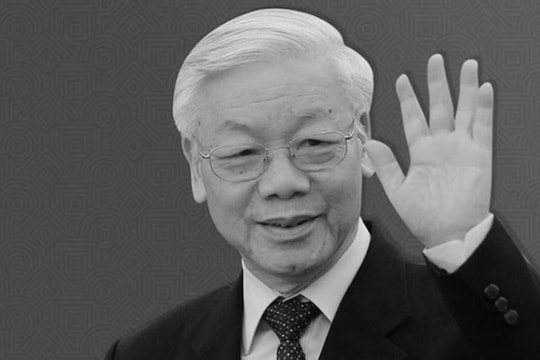
.jpg)
